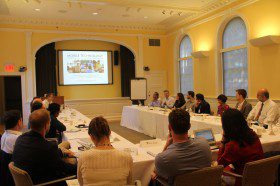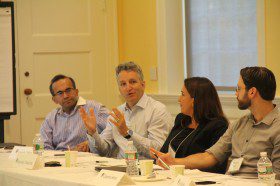Cell phones are no longer just a tool of communication – they are improving the lives of billions of people, especially in developing countries. The potential of mobile technology to change society was examined in an Exploratory Seminar titled ‘Using Cellphones to Change Societies’ hosted by SAI and the Radcliffe Institute for Advanced Study on September 4 and 5, 2014.
Led by Tarun Khanna, Director of SAI, Jorge Paulo Lemann Professor, Harvard Business School, and JP Onnela, Assistant Professor of Biostatistics, Harvard School of Public Health, the workshop assembled a diverse group of academics, medical practitioners, business executives and leading researchers to discuss the potential of the technology to enable economic and social mobility, particularly in the areas of health, banking, and education. The discussions helped to lay the groundwork for future interdisciplinary research and connections.
Each of the four sessions included presentations by experts, followed by a discussion. In the first session, participants discussed how mobile technology can be used in interdisciplinary interventions. There are many myths about technology, and it is important to understand both the positive and negative effects. Many companies like Telenor are using big data to improve credit and loans, for example. Mobile money has exciting potential in Afghanistan and other emerging markets, and mobile phones can help rural workers get paid. The field of mHealth was also explored, which is revolutionizing health care worldwide.
 The second session examined the useful business models for delivering services and also profits for the company, and the challenge many for-profit social enterprises face. Participants explained that the telecommunications market must adjust to the fact that land line use has fallen significantly while cell phone use has grown.
The second session examined the useful business models for delivering services and also profits for the company, and the challenge many for-profit social enterprises face. Participants explained that the telecommunications market must adjust to the fact that land line use has fallen significantly while cell phone use has grown.
Participants shared case studies of examples of for-profit agencies that have leveraged the potential of mobile technology, and explained how social well-being could be enabled with access to innovative technologies. BRAC, the world’s largest NGO, was pointed highlighted as an example of an organization that has used banking in improving social well-being. The discussion focused on how to launch these ventures and what infrastructure would be needed.
The third session focused on major obstacles and restrictive regulations impacting the research community’s access to data, especially related to obtaining the data, privacy, and transparency. Several research projects were discussed, including SAI’s Kumbh Mela data project, which was used to highlight the possibility of using cell phones and other existing technology, like iPads, to do disease surveillance at this large human gathering.
JP Onnela. HSPH, expanded on his research that uses big data to analyze social networks and human behavior. Data analysis is also being used for improving disease control and epidemic response. Participants also considered the legal perspective of this new field, given that analyzing big data can blur the boundaries of privacy and put pressure on researchers.
The fourth and final session focused on how to fund these efforts and how the various sectors of NGOS, government agencies, companies and foundations can work together to effect social change. Overall, the workshop provided participants the opportunity to collaborate and brainstorm how they can join forces to transform society using cell phones.
Mobile Technology is one of SAI’s 13 interfaculty multi-year research projects.

